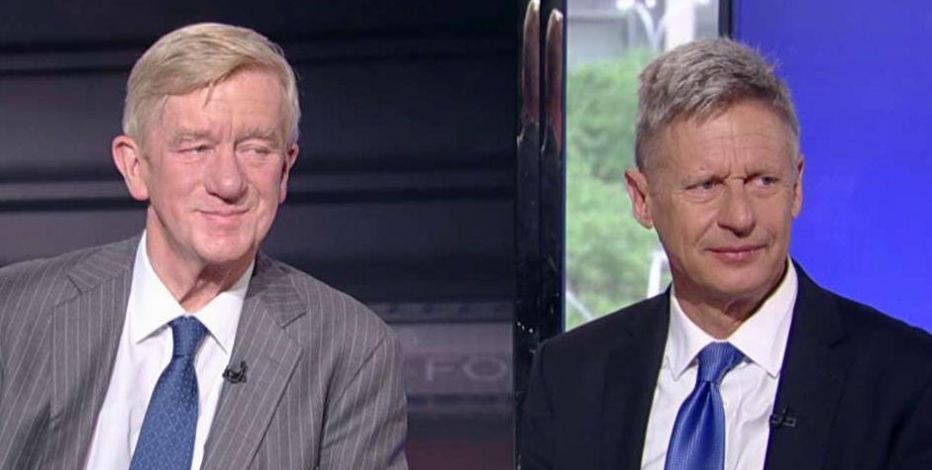Johnson, Weld Draw Line Between Philosophy and Politics
After what was likely the most contentious and heavily-publicized primary cycle in Libertarian Party history, former governors Gary Johnson and William Weld earned the party’s nominations for president and vice president, respectively, last weekend.
Though the two represent easily the most politically experienced and “qualified” (in the traditional sense of governing capabilities), each only narrowly won majorities on second ballots. Both faced stern opposition from party loyalists who expressed concern with a lack of ideological purity in the candidates. For Johnson, his opposition to “Religious Freedom” laws and favoring of public accommodations requirements drew particular ire, while for Weld, it was his past support for some gun control initiatives.
Nonetheless, both prevailed, resulting in the Libertarian Party and the newly-formed ticket receiving unprecedented levels of media attention. Instantly recognizable was that the loudest gripes about the two men came not from liberals or conservatives, but rather libertarians. While most LP members and libertarians have jumped on board with the duo, many have remained outspoken in their criticisms.
However, is it possible for one’s ideological purity to remain in tact, even as a more feasible (yet less perfect) option exists? This election cycle presents the conundrum in a seemingly better way than at any time in recent history.
As Jack Hunter explains, in nominating this ticket, the Libertarian Party has decided to “move the ball,” while necessarily sacrificing ideology in order to do so. As Mr. Hunter elaborates, both Rand Paul (the only libertarian(ish) individual to be elected to the US Senate in recent memory) and Ron Paul (among the most important figures ever in promoting libertarian ideas to wide-scale audiences) employed this strategy. Most notably, after running for president as a Libertarian in 1988, the elder Paul returned to the Republican Party in order to run for a House seat and eventually for president two more times.
Those men, too, received much criticism from libertarians when they strayed too far from orthodoxy. However, in sometimes tempering their language and necessarily adjusting to audiences, the Pauls spread the word of liberty more successfully than any others who have attempted to do so.
How does this relate to the Johnson-Weld ticket and the broader issues concerning libertarianism? It distinguishes the stark and distinct differences between philosophy and politics. When engaging in a philosophical, thoroughly ideological debate, libertarians ought to feel free to express (what to the general public may see as) the most extreme positions. Whether discussing the efficacy of a purely private police or the necessity of government courts, there is no sin in wondering aloud and exploring the furthest depths of what it means to be a “true” libertarian. This is the “radical” philosophy portion of what makes a “pragmadical.”
However, concurrent with not-yet-ripe policy proposals, a separate initiative needs to be taken in the political arena. This is the “pragmatic” side of “pragmadical.” Understanding that most Americans haven’t pondered the some questions that most die-hard libertarians have, it is first necessary to bring our ideology to them in a presentable manner. It does not matter if this is done in piecemeal or in an oversimplified manner (i.e. “fiscally conservative, socially liberal”); all that is of importance is that the public is gaining some idea of what it means to be libertarian.
Because of the general foreignness of libertarian ideas to Americans, the messengers are of the utmost importance. It is for this reason that Governors Johnson and Weld are perfect. The LP as a whole has an unproven track record, and voters want a sign that it is a legitimate party and/or a legitimate ideology. There is no better way than in putting forward two governors who have each won two terms in their respective states, earned consistent “A” and “B” fiscal grades from the Cato Institute, and according to David Boaz, are the “two most libertarian governors in memory.”
The two are obviously imperfect in their ideologies, but in an extremely favorable climate for third-parties, they grant to the Libertarian Party and its members the best chance at relevance; not just in 2016, but in all years following. Support of the ticket is not equivalent to “selling out” one’s ideology, as this ignores the massive distinctions between formulating and defending ideology, as opposed to working and advancing toward key political goals.
In 2016, it’s time for us to all act as “pragmadicals” for the future of libertarianism and the Libertarian Party.





4 comments
… [Trackback]
[…] Here you can find 53048 additional Information to that Topic: thelibertarianrepublic.com/gary-johnson-william-weld-and-the-rise-of-pragmadicals/ […]
… [Trackback]
[…] Find More on on that Topic: thelibertarianrepublic.com/gary-johnson-william-weld-and-the-rise-of-pragmadicals/ […]
… [Trackback]
[…] Find More to that Topic: thelibertarianrepublic.com/gary-johnson-william-weld-and-the-rise-of-pragmadicals/ […]
… [Trackback]
[…] Read More here on that Topic: thelibertarianrepublic.com/gary-johnson-william-weld-and-the-rise-of-pragmadicals/ […]